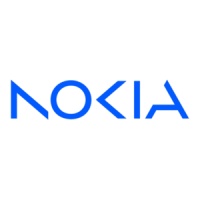PAY-AS-YOU-GROW FP4 HARDWARE LICENSING
REFERENCE GUIDE
Legacy 7750 SR and 7950 XRS Licensing
Issue: 02 3HE 15453 AAAA TQZZA 01 7
2 Legacy 7750 SR and 7950 XRS Licensing
This chapter describes the various license types.
Nokia’s IP Service Router (SR) products consist of orderable hardware components,
Service Router Operating System (SR OS) licenses and associated right to use
(RTU) licenses. Depending on the product family, the RTU licenses may be
applicable to:
• the system, meaning the chassis and all the components installed on that
chassis, including line cards
• particular line cards installed in a system (for example, IMMs)
The RTU licenses are sold with the hardware and initial SR OS and govern the use
of that hardware and SR OS. The RTU licenses define the entitlement to use specific
features and functionalities supported by the hardware and associated SR OS and
may also define the scale to which those features or functionalities can be used. At
all times and with all SR products, there is a strict association between the hardware
and a given set of RTU licenses; purchasing and/or deploying hardware without a set
of valid RTU licenses is not permitted. As well, once RTU licenses are assigned to a
system or system components, the RTU licenses cannot be transferred to or reused
with a different system or component. All RTU licenses are sold with a “term”
entitlement that corresponds to the life of the associated hardware system or
component; an RTU license term ends once that system or component is
permanently removed from the network.
2.1 SR OS Release Licenses
The SR OS Release licenses cover the basic operating system used on the
hardware platforms. An SR OS Release RTU must be purchased for each chassis
that is to operate in the network at a particular release level. New RTUs are
generated each time there is a major release of the SR OS, and new RTU licenses
must be purchased for node upgrades to a new release.

